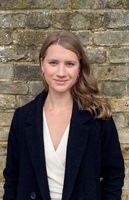Grace Field
United Kingdom
PhD History and Philosophy of Science, Trinity Hall
PhD thesis: Building Black Holes – Analogue Experiments and Analogical Reasoning
PhD project
Analogue experiments investigate empirically accessible ‘source’ systems that are meant to mirror the behaviour of less accessible ‘target’ systems. Using table-top physical scale models of black holes as a case study, my dissertation aimed to answer two questions about analogue experiments. First, what are they useful for? Second, how do analogical reasoning and the reasoning underlying analogue experimentation compare to other forms of inductive reasoning? The first question has been controversial ever since experiments began to reveal effects in ‘analogue’ table-top model black holes which are in principle impossible to detect from ‘real’ astrophysical black holes. The second question connects analogue experimentation with the broader landscape of inductive reasoning, including the problem of induction, analogical reasoning more broadly construed, and simulation and modelling. After providing background on both analogical reasoning and analogue experimentation, I argue that analogue experiments can in principle provide significant confirmation for claims about their target systems, but only when supplemented with an independently plausible claim which is significantly positively relevant to both the source and target systems. I also use recent developments in analogue gravity to show that analogue experiments can be useful for reasons beyond confirmation of hypotheses about their target systems. They can directly detect generalised phenomena, and they can be used as exploratory tools to show us where to look in less accessible target systems.
After the PhD
After wrapping up my PhD, I joined ICF as an Environmental Policy Consultant. In my role as a Senior Consultant, I provide research, analysis and evaluation services for UK government clients, using mixed methods analysis to assess the progress of policy interventions and generate lessons for future delivery. I work with a range of clients across government, including Defra, Natural England and the Department for Transport, covering topics from peatland restoration to transport decarbonisation. One of the most exciting projects I am currently delivering is a 3-year evaluation of the ~£700 million Nature for Climate Fund Tree Programme, the scheme tasked with tripling tree planting rates in England by the end of 2025. Moving into environmental policy after my PhD was a shift away from the details of my thesis topic and towards the broader science policy work I had the opportunity to be involved with at Cambridge through the Cambridge University Science and Policy Exchange. I was also fortunate to be able to complete a placement as a UK government Policy Advisor during the third year of my PhD — a placement which was supported by the Harding Scholarship, and which gave me a chance to develop my interest and experience in the interface between science, evidence and policy.

